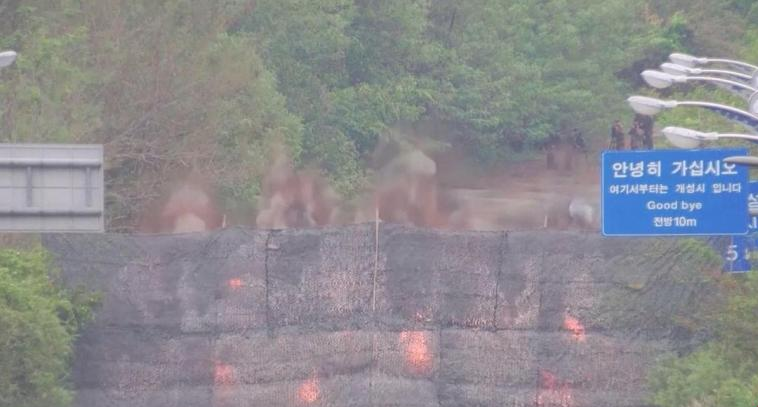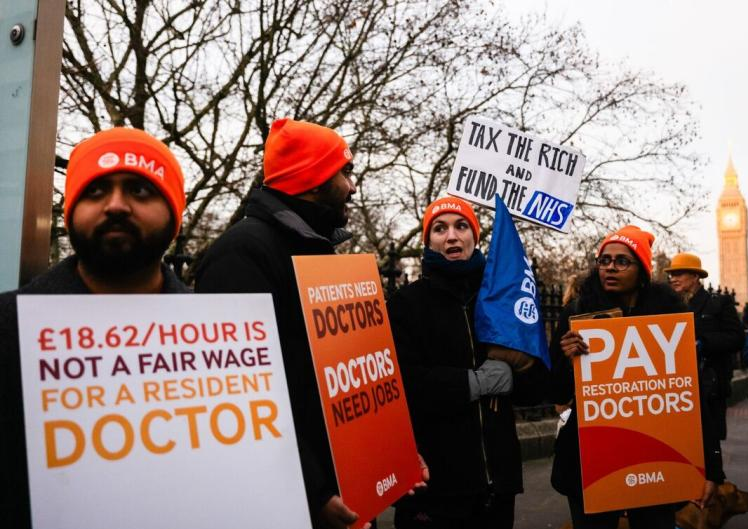
North Korea, which has been threatening to blow up a road connecting the two Koreas for days, blew up part of the border near the military demarcation line Tuesday. In response, South Korean troops fired south of the military demarcation line. South Korean public opinion pointed out that this is not only the destruction of the symbolic connection between the two Koreas, but also means the end of more than 20 years of inter-Korean economic cooperation projects.
South Korea's Joint Chiefs of Staff said the North Korean military blew up parts of the inter-Korean border roads - the Gyeongui Line (west) and the East Sea Line (east) - at around 12 noon on Tuesday (October 15), north of the military demarcation line, and the South Korean military maintained a high state of surveillance and alert.
North Korea's army General Staff announced on Tuesday that it will cut off all roads and railways connecting the North with South Korea from October 9 and strengthen its defense facilities.
The South Korean military has warned that the North's actions will not stop at such displays, and that Pyongyang is expected to prepare more provocations. If North Korea makes further provocations, South Korea will respond with strong measures in self-defense.
North Korean leader Kim Jong UN convened a high-level national security meeting on Saturday and ordered a plan for "current military action" amid heightened tensions with South Korea, KCNA reported. The meeting in Pyongyang was attended by North Korea's top security officials, including the army chief of staff and other military officials, as well as the minister of National defense and the minister of defense.
In 2000, after the first inter-Korean summit between South Korean President Kim Dae-jung and the late North Korean leader Kim Jong-il, the two Koreas agreed to connect the Gyeongui and Donghae lines by rail and road. Since then, inter-Korean relations have been strained by the killing of a South Korean tourist at Mount Kumgang and the North's nuclear and missile provocations, and the Gyeongui and East Sea lines have remained only symbolic.
Jeong Se-hyun, South Korea's former unification minister, told Yonhap news agency that although the project to link the inter-Korean road was symbolic of saving the land route that had been suspended for 50 years due to the war, he was saddened that it had been stalled for various reasons in 22 years. Despite the relatively short range of the project, it will take a long time to truly improve inter-Korean relations and fully reconnect railways and roads.
Since Kim Jong UN described inter-Korean relations as "hostile" in December last year, the North has taken steps to cut off land routes between the two Koreas in phases. Starting with the planting of mines around the Gyeongui Line road in November 2023, mines will be planted on the Donghae Line in December, road barriers will be removed on the Donghae Line in March this year, and road lights will be removed on the Gyeongui Line in April. After May, the railway and sleepers of the Donghai Line and the Kyongui Line began to be dismantled. In August, the Kyongui Line train storage facility was demolished. With the North's destruction of the Gyeongui and East Sea lines, the only land route connecting the two Koreas remains Arrowhead Heights and the Joint Security Area (JSA) at Panmunjom.
South Korea's MBN TV news pointed out that the construction of the inter-Korean highway is regarded as a symbol of peace between the two Koreas, and a large amount of Korean taxpayers' money, about 180 billion won, has been invested. North Korea's move not only disrupted inter-Korean transport links, but also dealt a major blow to peace efforts between the two sides.
Hong Min of the Institute for National Unification pointed out that North Korea's tough action this time seems to be a kind of "shock therapy." This is similar to North Korea's bombing of the Inter-Korean Joint liaison office in June 2020, which is aimed at attracting attention through extreme actions and expressing discontent and hostility toward the South Korean government.

Junior doctors in the UK officially launched a five-day strike on Wednesday (December 17th).
Junior doctors in the UK officially launched a five-day str…
The Thai Pride Party is considering nomasting three candida…
With the continuous intensification of international sancti…
With $15.82 billion in sales and a 108% year-over-year incr…
According to the South Korean media Dealsite, the recent te…
The current geopolitical conflicts around the world are oft…